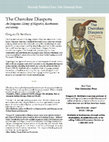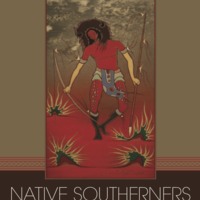Books by Gregory Smithers

Long before the indigenous people of southeastern North America first encountered Europeans and A... more Long before the indigenous people of southeastern North America first encountered Europeans and Africans, they established communities with clear social and political hierarchies and rich cultural traditions. Award-winning historian Gregory D. Smithers brings this world to life in Native Southerners, a sweeping narrative of American Indian history in the Southeast from the time before European colonialism to the Trail of Tears and beyond.
In the Native South, as in much of North America, storytelling is key to an understanding of origins and tradition—and the stories of the indigenous people of the Southeast are central to Native Southerners. Spanning territory reaching from modern-day Louisiana and Arkansas to the Atlantic coast, and from present-day Tennessee and Kentucky through Florida, this book gives voice to the lived history of such well-known polities as the Cherokees, Creeks, Seminoles, Chickasaws, and Choctaws, as well as smaller Native communities like the Nottoway, Occaneechi, Haliwa-Saponi, Catawba, Biloxi-Chitimacha, Natchez, Caddo, and many others. From the oral and cultural traditions of these Native peoples, as well as the written archives of European colonists and their Native counterparts, Smithers constructs a vibrant history of the societies, cultures, and people that made and remade the Native South in the centuries before the American Civil War. What emerges is a complex picture of how Native Southerners understood themselves and their world—a portrayal linking community and politics, warfare and kinship, migration, adaptation, and ecological stewardship—and how this worldview shaped and was shaped by their experience both before and after the arrival of Europeans.
As nuanced in detail as it is sweeping in scope, the narrative Smithers constructs is a testament to the storytelling and the living history that have informed the identities of Native Southerners to our day.
REVIEWS & PRAISE
“Native Southerners tries to rectify prejudices and limitations by focusing on the histories of Indian tribes in the South with an emphasis upon their own stories. Gregory D. Smithers’s use of oral histories is a highlight of his work, and he also covers the ongoing reality of climate change in the development of southern tribes. Many themes emerge, but one—the endless effort to maintain communal identity in the face of colonization, disease, and displacement—is most powerful.” —Tim Kaine, U.S. Senator from Virginia
“Native Southerners is a journey through centuries of southern Native American history. This thoughtful and sensitive narrative offers a compelling perspective on the clashes between Natives and Europeans, which forever changed the lives of the southern Native population.” —Lynette Allston, Chief of the Nottoway Indian Tribe of Virginia
“Ranging from Virginia to Indian Territory and covering the era of paramount chiefdoms to the post-Removal years, Native Southerners will be the go-to book for teachers and researchers for many years to come. An indispensable work for all scholars of southern Indians.” —Angela Pulley Hudson, author of Creek Paths and Federal Roads: Indians, Settlers, and Slaves and the Making of the American South
“Indigenous actors and voices are front and center in this graceful narrative of the Native South, testifying to their survival and adaptability even as waves of aggressive settlers sought their removal and extinction. Native Southerners is well suited for the classroom and a handy reference for specialists.” —Andrew K. Frank, author of Before the Pioneers: Indians, Settlers, Slaves, and the Founding of Miami

Science, Sexuality, and Race in the United States and Australia, 1780–1940, Revised Edition is a ... more Science, Sexuality, and Race in the United States and Australia, 1780–1940, Revised Edition is a sociohistorical tour de force that examines the entwined formation of racial theory and sexual constructs within settler colonialism in the United States and Australia from the Age of Revolution to the Great Depression. Gregory D. Smithers historicizes the dissemination and application of scientific and social-scientific ideas within the process of nation building in two countries with large Indigenous populations and shows how intellectual constructs of race and sexuality were mobilized to subdue Aboriginal peoples.
Building on the comparative settler-colonial and imperial histories that appeared after the book’s original publication, this completely revised edition includes two new chapters. In this singular contribution to the study of transnational and comparative settler colonialism, Smithers expands on recent scholarship to illuminate both the subject of the scientific study of race and sexuality and the national and interrelated histories of the United States and Australia.

The Cherokee are one of the largest Native American tribes in the United States, with more than t... more The Cherokee are one of the largest Native American tribes in the United States, with more than three hundred thousand people across the country claiming tribal membership and nearly one million people internationally professing to have at least one Cherokee Indian ancestor. In this revealing history of Cherokee migration and resettlement, Gregory Smithers uncovers the origins of the Cherokee diaspora and explores how communities and individuals have negotiated their Cherokee identities, even when geographically removed from the Cherokee Nation headquartered in Tahlequah, Oklahoma. Beginning in the eighteenth century, the author transports the reader back in time to tell the poignant story of the Cherokee people migrating throughout North America, including their forced exile along the infamous Trail of Tears (1838–39). Smithers tells a remarkable story of courage, cultural innovation, and resilience, exploring the importance of migration and removal, land and tradition, culture and language in defining what it has meant to be Cherokee for a widely scattered people.
The arrival of European settlers in the Americas disrupted indigenous lifeways, and the effects o... more The arrival of European settlers in the Americas disrupted indigenous lifeways, and the effects of colonialism shattered Native communities. Forced migration and human trafficking created a diaspora of cultures, languages, and people. Gregory D. Smithers and Brooke N. Newman have gathered the work of leading scholars, including Bill Anthes, Duane Champagne, Daniel Cobb, Donald Fixico, and Joy Porter, among others, in examining an expansive range of Native peoples and the extent of their influences through reaggregation. These diverse and wide-ranging essays uncover indigenous understandings of self-identification, community, and culture through the speeches, cultural products, intimate relations, and political and legal practices of Native peoples.

Science, sexuality, and race in the United States and Australia, 1780s-1890s
This book combines transnational history with the comparative analysis of racial formation and re... more This book combines transnational history with the comparative analysis of racial formation and reproductive sexuality in the settler colonial spaces of the United States and British Australia. Specifically, the book places "whiteness," and the changing definition of what it meant to be white in nineteenth-century America and Australia, at the center of our historical understanding of racial and sexual identities. In both the United States and Australia, "whiteness" was defined in opposition to the imagined cultural and biological inferiority of the "Indian," "Negro," and "Aboriginal savage." Moreover, Euro-Americans and Euro-Australians shared a common belief that "whiteness" was synonymous with the extension of settler colonial civilization. Despite this, two very different understandings of "whiteness" emerged in the nineteenth century. The book therefore asks why these different racial understandings of "whiteness" – and the quest to create culturally and racially homogeneous settler civilizations – developed in the United States and Australia.

The preacher and the politician: Jeremiah Wright, Barack Obama, and race in America
Barack Obama’s inauguration as the first African American president of the United States has caus... more Barack Obama’s inauguration as the first African American president of the United States has caused many commentators to conclude that America has entered a postracial age. The Preacher and the Politician argues otherwise, reminding us that, far from inevitable, Obama’s nomination was nearly derailed by his relationship with Jeremiah Wright, the outspoken former pastor of Trinity United Church of Christ on the South Side of Chicago. The media storm surrounding Wright’s sermons, the historians Clarence E. Walker and Gregory D. Smithers suggest, reveals that America’s fraught racial past is very much with us, only slightly less obvious.
With meticulous research and insightful analysis, Walker and Smithers take us back to the Democratic primary season of 2008, viewing the controversy surrounding Wright in the context of enduring religious, political, and racial dynamics in American history. In the process they expose how the persistence of institutional racism, and racial stereotypes, became a significant hurdle for Obama in his quest for the presidency.
The authors situate Wright's preaching in African American religious traditions dating back to the eighteenth century, but they also place his sermons in a broader prophetic strain of Protestantism that transcends racial categories. This latter connection was consistently missed or ignored by pundits on the right and the left who sought to paint the story in simplistic, and racially defined, terms. Obama’s connection with Wright gave rise to criticism that, according to Walker and Smithers, sits squarely in the American political tradition, where certain words are meant to incite racial fear, in the case of Obama with charges that the candidate was unpatriotic, a Marxist, a Black Nationalist, or a Muslim.
Once Obama became the Democratic nominee, the day of his election still saw ballot measures rejecting affirmative action and undermining the civil rights of other groups. The Preacher and the Politician is a concise and timely study that reminds us of the need to continue to confront the legacy of racism even as we celebrate advances in racial equality and opportunity.
Papers by Gregory Smithers
The History Teacher, 2019

“'Our Hands and Hearts are Joined Together': Friendship, Colonialism, and the Cherokee People in Early America," Journal of Social History 50, no. 4 (2017): 609-629
The eighteenth and early nineteenth centuries proved transformative for Cherokee people. At the d... more The eighteenth and early nineteenth centuries proved transformative for Cherokee people. At the dawn of the eighteenth century, Cherokees lived in towns and nurtured strong regional affiliations that were overlaid with the sacred obligations associated with membership in one of seven matrilineal clans. But all this changed. The encroaching Anglo settler frontier from the east and pressure from the Spanish, the French, and hostile Native warriors from the north all prompted changes in how Cherokee people represented themselves to outsiders. This article draws on colonial archives, missionary records, ethnographic travel writing, and the written and oral traditions of the Cherokee people to explore the importance of friendship among Cherokees in the Native South. What did friendship mean to Cherokees? How did Cherokees represent friendship? And how was friendship performed (and those performances interpreted) in diplomatic, social, and cultural contexts? These questions frame this essay's analysis as it seeks to enrich our understanding of friendship in Cherokee history and to highlight what Cherokee Chiefs meant when they declared " Our Hands and Hearts are Joined Together. " In September 1730, commissioners from the British Board of Trade and leading Cherokee chiefs met at Whitehall in London to thrash out a diplomatic and trade agreement. That agreement, entitled " Articles of Friendship and Commerce, " reflected the determination of the British to secure an agreement with powerful Cherokee chiefs in the hope that that accord might secure exclusive trading rights with the Cherokee people and ultimately pave the way for the British to make further trade and territorial inroads through the interior South and beyond.
Scholarly and political efforts to end racism are popularly imagined in progressiveterms.Duringth... more Scholarly and political efforts to end racism are popularly imagined in progressiveterms.Duringthelatenineteenthandearlytwentiethcenturies, however, progressive attempts to end racism involved racist motives and some truly sinister methods. This essay focuses on the professional correspondence, ideas, and international travels of Aleš Hrdlička, the curator of anthropology at the Smithsonian Institute in Washington, DC. Hrdlička was one of the leading anthropological figures in the fight to end racism at the turn of the century. As this essay demonstrates, Hrdlička’s anti-racism was premised on biologically absorbing and cul- turally assimilating indigenous peoples into communities of European (white) descent. The professional life and ideas of Aleš Hrdlička thus exposes a darker side to the modern fight to end racism.

“Cherokee ‘Two-Spirits’: Gender, Ritual, and Spirituality in the Native South, 1770s-1840s,” Early American Studies 12, no. 3 (Fall 2014)
Abstract
http://muse.jhu.edu/article/552419
Since the sixteenth century, European and Euro... more Abstract
http://muse.jhu.edu/article/552419
Since the sixteenth century, European and Euroamerican observers have puzzled over the identity, roles, and sexuality of the berdache, or what scholars now refer to as two-spirit people, in Native American societies in the Southeast. Formerly the domain of anthropological research, over the past generation gender theorists and Lesbian, Gay, Bisexual, and Transgender (LGBT) scholars have produced fine studies that aim to demystify two spirits and decouple them from the racialized and heteronormative modes of thinking associated with settler colonialism in North America. As this activist scholarship continues to grow, historians of early America have at best played a marginal role in scholarly debates about two-spirit people. This essay represents a historical intervention in the current scholarly discussions about two-spirit people. Focusing particularly on the Cherokee in early America, the following analysis considers the methodological challenges associated with historical studies of two spirits, and presents insights into how historians might effectively craft more sophisticated and nuanced analyses of people variously referred to as hermaphrodites, sodomites, berdache, and two-spirit people in Native American societies of the Southeast.
American Abolitionism and Slave-Breeding Discourse: A Re-evaluation
Slave-breeding is a topic that has long divided American historians. Since the late nineteenth ce... more Slave-breeding is a topic that has long divided American historians. Since the late nineteenth century, historians have sought out empirical evidence to prove or disprove the idea that some slave owners deliberately bred slaves for sale or to augment their own labour force. As a result, the historiographical treatment of slave-breeding has become bogged down in what Herbert Gutman called
Journal of World History, Jan 1, 2009
Journal of African American History, Jan 1, 2008
THE'OLD COCK'AND BLACK'DOLL': A CHEROKEE-BLACK MARRIAGE IN THE NINETEENTH-CENTURY UNITED STATES
Australasian Journal of American Studies, Jan 1, 2006
Page 1. AUSTRALASIAN JOURNAL OF AMERICAN STUDIES 85 REVIEW ESSAY THE 'OLD COCK5 AND BLAC... more Page 1. AUSTRALASIAN JOURNAL OF AMERICAN STUDIES 85 REVIEW ESSAY THE 'OLD COCK5 AND BLACK 'DOLL': A CHEROKEE-BLACK MARRIAGE IN THE NINETEENTH-CENTURY UNITED STATES GREGORY D. SMITHERS ...
Journal of Social History, Jan 1, 2003
The strains of breeding: Settler colonialism and managed miscegenation in the United States and Australia, 1760s--1890s
UMI, ProQuest ® Dissertations & Theses. The world's most comprehensive collectio... more UMI, ProQuest ® Dissertations & Theses. The world's most comprehensive collection of dissertations and theses. Learn more... ProQuest, The strains of breeding: Settler colonialism and managed miscegenation in the United States and Australia, 1760s--1890s. ...
Reassuring" White Australia": A Review of The Fabrication of Aboriginal History: Volume One, Van Diemen's Land 1803-1847
Journal of Social History, Jan 1, 2003
Journal of Social History Copyright © 2003 by Peter N. Stearns. All rights reserved. Journal of S... more Journal of Social History Copyright © 2003 by Peter N. Stearns. All rights reserved. Journal of Social History 37.2 (2003) 493-505, ...











Uploads
Books by Gregory Smithers
In the Native South, as in much of North America, storytelling is key to an understanding of origins and tradition—and the stories of the indigenous people of the Southeast are central to Native Southerners. Spanning territory reaching from modern-day Louisiana and Arkansas to the Atlantic coast, and from present-day Tennessee and Kentucky through Florida, this book gives voice to the lived history of such well-known polities as the Cherokees, Creeks, Seminoles, Chickasaws, and Choctaws, as well as smaller Native communities like the Nottoway, Occaneechi, Haliwa-Saponi, Catawba, Biloxi-Chitimacha, Natchez, Caddo, and many others. From the oral and cultural traditions of these Native peoples, as well as the written archives of European colonists and their Native counterparts, Smithers constructs a vibrant history of the societies, cultures, and people that made and remade the Native South in the centuries before the American Civil War. What emerges is a complex picture of how Native Southerners understood themselves and their world—a portrayal linking community and politics, warfare and kinship, migration, adaptation, and ecological stewardship—and how this worldview shaped and was shaped by their experience both before and after the arrival of Europeans.
As nuanced in detail as it is sweeping in scope, the narrative Smithers constructs is a testament to the storytelling and the living history that have informed the identities of Native Southerners to our day.
REVIEWS & PRAISE
“Native Southerners tries to rectify prejudices and limitations by focusing on the histories of Indian tribes in the South with an emphasis upon their own stories. Gregory D. Smithers’s use of oral histories is a highlight of his work, and he also covers the ongoing reality of climate change in the development of southern tribes. Many themes emerge, but one—the endless effort to maintain communal identity in the face of colonization, disease, and displacement—is most powerful.” —Tim Kaine, U.S. Senator from Virginia
“Native Southerners is a journey through centuries of southern Native American history. This thoughtful and sensitive narrative offers a compelling perspective on the clashes between Natives and Europeans, which forever changed the lives of the southern Native population.” —Lynette Allston, Chief of the Nottoway Indian Tribe of Virginia
“Ranging from Virginia to Indian Territory and covering the era of paramount chiefdoms to the post-Removal years, Native Southerners will be the go-to book for teachers and researchers for many years to come. An indispensable work for all scholars of southern Indians.” —Angela Pulley Hudson, author of Creek Paths and Federal Roads: Indians, Settlers, and Slaves and the Making of the American South
“Indigenous actors and voices are front and center in this graceful narrative of the Native South, testifying to their survival and adaptability even as waves of aggressive settlers sought their removal and extinction. Native Southerners is well suited for the classroom and a handy reference for specialists.” —Andrew K. Frank, author of Before the Pioneers: Indians, Settlers, Slaves, and the Founding of Miami
Building on the comparative settler-colonial and imperial histories that appeared after the book’s original publication, this completely revised edition includes two new chapters. In this singular contribution to the study of transnational and comparative settler colonialism, Smithers expands on recent scholarship to illuminate both the subject of the scientific study of race and sexuality and the national and interrelated histories of the United States and Australia.
With meticulous research and insightful analysis, Walker and Smithers take us back to the Democratic primary season of 2008, viewing the controversy surrounding Wright in the context of enduring religious, political, and racial dynamics in American history. In the process they expose how the persistence of institutional racism, and racial stereotypes, became a significant hurdle for Obama in his quest for the presidency.
The authors situate Wright's preaching in African American religious traditions dating back to the eighteenth century, but they also place his sermons in a broader prophetic strain of Protestantism that transcends racial categories. This latter connection was consistently missed or ignored by pundits on the right and the left who sought to paint the story in simplistic, and racially defined, terms. Obama’s connection with Wright gave rise to criticism that, according to Walker and Smithers, sits squarely in the American political tradition, where certain words are meant to incite racial fear, in the case of Obama with charges that the candidate was unpatriotic, a Marxist, a Black Nationalist, or a Muslim.
Once Obama became the Democratic nominee, the day of his election still saw ballot measures rejecting affirmative action and undermining the civil rights of other groups. The Preacher and the Politician is a concise and timely study that reminds us of the need to continue to confront the legacy of racism even as we celebrate advances in racial equality and opportunity.
Papers by Gregory Smithers
http://muse.jhu.edu/article/552419
Since the sixteenth century, European and Euroamerican observers have puzzled over the identity, roles, and sexuality of the berdache, or what scholars now refer to as two-spirit people, in Native American societies in the Southeast. Formerly the domain of anthropological research, over the past generation gender theorists and Lesbian, Gay, Bisexual, and Transgender (LGBT) scholars have produced fine studies that aim to demystify two spirits and decouple them from the racialized and heteronormative modes of thinking associated with settler colonialism in North America. As this activist scholarship continues to grow, historians of early America have at best played a marginal role in scholarly debates about two-spirit people. This essay represents a historical intervention in the current scholarly discussions about two-spirit people. Focusing particularly on the Cherokee in early America, the following analysis considers the methodological challenges associated with historical studies of two spirits, and presents insights into how historians might effectively craft more sophisticated and nuanced analyses of people variously referred to as hermaphrodites, sodomites, berdache, and two-spirit people in Native American societies of the Southeast.
In the Native South, as in much of North America, storytelling is key to an understanding of origins and tradition—and the stories of the indigenous people of the Southeast are central to Native Southerners. Spanning territory reaching from modern-day Louisiana and Arkansas to the Atlantic coast, and from present-day Tennessee and Kentucky through Florida, this book gives voice to the lived history of such well-known polities as the Cherokees, Creeks, Seminoles, Chickasaws, and Choctaws, as well as smaller Native communities like the Nottoway, Occaneechi, Haliwa-Saponi, Catawba, Biloxi-Chitimacha, Natchez, Caddo, and many others. From the oral and cultural traditions of these Native peoples, as well as the written archives of European colonists and their Native counterparts, Smithers constructs a vibrant history of the societies, cultures, and people that made and remade the Native South in the centuries before the American Civil War. What emerges is a complex picture of how Native Southerners understood themselves and their world—a portrayal linking community and politics, warfare and kinship, migration, adaptation, and ecological stewardship—and how this worldview shaped and was shaped by their experience both before and after the arrival of Europeans.
As nuanced in detail as it is sweeping in scope, the narrative Smithers constructs is a testament to the storytelling and the living history that have informed the identities of Native Southerners to our day.
REVIEWS & PRAISE
“Native Southerners tries to rectify prejudices and limitations by focusing on the histories of Indian tribes in the South with an emphasis upon their own stories. Gregory D. Smithers’s use of oral histories is a highlight of his work, and he also covers the ongoing reality of climate change in the development of southern tribes. Many themes emerge, but one—the endless effort to maintain communal identity in the face of colonization, disease, and displacement—is most powerful.” —Tim Kaine, U.S. Senator from Virginia
“Native Southerners is a journey through centuries of southern Native American history. This thoughtful and sensitive narrative offers a compelling perspective on the clashes between Natives and Europeans, which forever changed the lives of the southern Native population.” —Lynette Allston, Chief of the Nottoway Indian Tribe of Virginia
“Ranging from Virginia to Indian Territory and covering the era of paramount chiefdoms to the post-Removal years, Native Southerners will be the go-to book for teachers and researchers for many years to come. An indispensable work for all scholars of southern Indians.” —Angela Pulley Hudson, author of Creek Paths and Federal Roads: Indians, Settlers, and Slaves and the Making of the American South
“Indigenous actors and voices are front and center in this graceful narrative of the Native South, testifying to their survival and adaptability even as waves of aggressive settlers sought their removal and extinction. Native Southerners is well suited for the classroom and a handy reference for specialists.” —Andrew K. Frank, author of Before the Pioneers: Indians, Settlers, Slaves, and the Founding of Miami
Building on the comparative settler-colonial and imperial histories that appeared after the book’s original publication, this completely revised edition includes two new chapters. In this singular contribution to the study of transnational and comparative settler colonialism, Smithers expands on recent scholarship to illuminate both the subject of the scientific study of race and sexuality and the national and interrelated histories of the United States and Australia.
With meticulous research and insightful analysis, Walker and Smithers take us back to the Democratic primary season of 2008, viewing the controversy surrounding Wright in the context of enduring religious, political, and racial dynamics in American history. In the process they expose how the persistence of institutional racism, and racial stereotypes, became a significant hurdle for Obama in his quest for the presidency.
The authors situate Wright's preaching in African American religious traditions dating back to the eighteenth century, but they also place his sermons in a broader prophetic strain of Protestantism that transcends racial categories. This latter connection was consistently missed or ignored by pundits on the right and the left who sought to paint the story in simplistic, and racially defined, terms. Obama’s connection with Wright gave rise to criticism that, according to Walker and Smithers, sits squarely in the American political tradition, where certain words are meant to incite racial fear, in the case of Obama with charges that the candidate was unpatriotic, a Marxist, a Black Nationalist, or a Muslim.
Once Obama became the Democratic nominee, the day of his election still saw ballot measures rejecting affirmative action and undermining the civil rights of other groups. The Preacher and the Politician is a concise and timely study that reminds us of the need to continue to confront the legacy of racism even as we celebrate advances in racial equality and opportunity.
http://muse.jhu.edu/article/552419
Since the sixteenth century, European and Euroamerican observers have puzzled over the identity, roles, and sexuality of the berdache, or what scholars now refer to as two-spirit people, in Native American societies in the Southeast. Formerly the domain of anthropological research, over the past generation gender theorists and Lesbian, Gay, Bisexual, and Transgender (LGBT) scholars have produced fine studies that aim to demystify two spirits and decouple them from the racialized and heteronormative modes of thinking associated with settler colonialism in North America. As this activist scholarship continues to grow, historians of early America have at best played a marginal role in scholarly debates about two-spirit people. This essay represents a historical intervention in the current scholarly discussions about two-spirit people. Focusing particularly on the Cherokee in early America, the following analysis considers the methodological challenges associated with historical studies of two spirits, and presents insights into how historians might effectively craft more sophisticated and nuanced analyses of people variously referred to as hermaphrodites, sodomites, berdache, and two-spirit people in Native American societies of the Southeast.